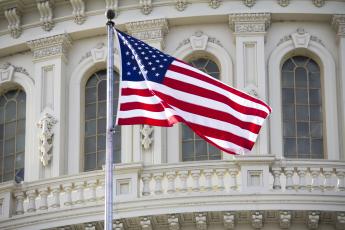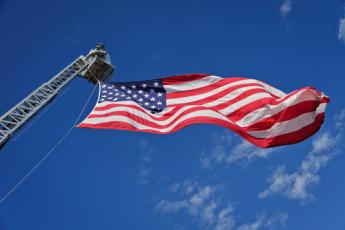The sudden and dramatic restructuring of the economy and societal routines brought on by the COVID-19 pandemic left many nonprofits and frontline communities under tremendous financial pressures. America’s fuel and petrochemical companies stepped in swiftly with critical donations to help vulnerable populations weather this difficult time.
Supporting Frontline and Medical Workers
The COVID-19 pandemic has resulted in an unparalleled strain on health care workers, disaster relief organizations, and other frontline groups. And these critical champions emerged as one of the common areas for charitable support by fuel and petrochemical companies.
Marathon Petroleum donated $1 million to the American Red Cross to help supply disaster relief resources and support those in crisis during the pandemic, putting its financial weight behind one of the country’s most respected charitable organizations.
Dow donated $2 million to the World Health Organization’s COVID-19 Solidarity Fund, the humanitarian organization Direct Relief, and to local and regional nonprofits worldwide. They have also reserved another $1 million to help build community resilience during the post-COVID recovery phase.
ExxonMobil, meanwhile, has organized a number of donations to support frontline workers in Texas, committing over $450,000 to Houston-area relief efforts. This includes a $100,000 contribution for personal protective equipment to Texas Medical Center member hospitals, the Houston Police Foundation, the Fire Fighters Foundation of Houston and the Spring Fire Department as well as a $100,000 donation to the TX Restaurant Relief Fund for the preparation and delivery of approximately 6,000 meals for frontline workers at these organizations.
Phillips 66 committed $3 million to support frontline communities in the United States and United Kingdom. This includes a $1 million donation to the Greater Houston COVID-19 Recovery Fund, as well as numerous donations to organizations supporting COVID relief efforts, including:
- Phillips 66 refineries in California, Montana and Louisiana allocating funds and materials to efforts using 3D printers to address the face mask and face shield shortages.
- A $50,000 donation by the Phillips 66 Bayway Refinery to Trinitas Regional Medical Center in hard-hit New Jersey, to purchase personal protection equipment such as masks, face shields, gowns, booties and hats, as well as defraying the cost of a new ventilator.
- Over $25,000 from the Phillips 66 Borger Refinery going to supplying PPE, test kits, and other necessary supplies to the Golden Plains Community Hospital, first responders and other health care organizations in Texas.
- The Phillips 66 San Francisco Refinery donating $25,000 to the County of San Luis Obispo Office of Emergency Services to support efforts to limit the spread of COVID-19 by transforming the Cal Poly Recreation Center into an alternate care site for patients who are between hospitalization and home care.
- Phillips 66 Ferndale donating $60,000 to the Whatcom County, Washington, coordinated COVID-19 response unit to help provide software at the emergency operations facility, a unified command website, and volunteer training.
Since some companies and facilities have not publicized their donations, this is only a partial list of the efforts made on behalf of those fighting the COVID-19 pandemic.
Supporting local communities
The fuel and petrochemical industries have a long history of supporting the communities in which they live and operate, and they have amped up that support during this difficult time.
Valero Energy Corporation has made a $1.8 million commitment to help communities survive the COVID-19 pandemic, with donations going to the South Texas Blood & Tissue Center, Meals on Wheels, University Health System Foundation, Family Services Assistance, Family Violence Prevention Services, Respite Care of San Antonio, ChildSafe and Haven for Hope, among others.
Westlake Chemical has also donated generously by giving $1 million to the Greater Houston COVID-19 Recovery Fund, which was established by the United Way of Greater Houston and the Greater Houston Community Foundation to provide emergency assistance for individuals adversely affected by the pandemic.
And SABIC has similarly announced a donation of approximately $1 million to food banks and community-based nonprofits in the communities where they operate.
Chevron, meanwhile, has given more than $7 million worldwide to humanitarian organizations, and is matching employee donations two to one. Over $2 million has been donated to local relief efforts in several U.S. states, and they have committed an additional $2 million to match employee contributions to U.S.-based nonprofits.
Combatting Hunger
While there are a number of critical community service priorities, ensuring that vulnerable populations don’t go hungry is a particular concern.
LyondellBasell is donating $1.3 million to alleviate hunger and food insecurity during this difficult time, with money going towards the Global FoodBanking Network and United States local food banks.
BASF is also joining in the fight against hunger, partnering with its North America Agricultural Solutions business and several U.S. sites to donate more than $365,000 to Feeding America, the nation’s largest domestic hunger-relief organization. BASF will continue to match employee contributions up to $500 per employee through the company’s matching gifts program, and all contributions will support Feeding America’s network of food banks. BASF has also donated $50,000 to the Greater Baton Rouge Food Bank, including ongoing support to feed hungry students through the BackPack program. And the BASF site in Freeport, Texas has donated $10,000 to ActionS to provide meals, groceries, and basic necessities for senior citizens who were or have become homebound because of the COVID-19 pandemic.
ExxonMobil’s commitment to the Houston area extended to addressing food insecurity, with a $250,000 donation to the Houston Food Bank and Montgomery County Food Bank – enough to provide about one million meals to Houston-area residents.
And Chevron’s $7 million philanthropic contributions have included donations to food banks in California, Texas, New Mexico, Louisiana, Pennsylvania, and West Virginia.
Addressing hunger was also a critical component of Phillips 66’s commitment to frontline communities, with donations going to food banks in California, Louisiana, and Texas.
And HollyFrontier worked with local businesses to give away a thousand boxes and bags of groceries, including gas cards, to families near its Artesia, New Mexico facility.
Enabling Education
Like so many other aspects of daily life, education has been transformed by the COVID-19 pandemic. AFPM member companies have been doing what they can to help underprivileged students adapt to this new challenge.
CITGO, in partnership with the Harris County Sheriff’s Office, donated Kindles to the to the Houston and Alief Independent School Districts to help support low-income students' e-learning needs during the COVID-19 school closures and the subsequent move to remote learning platforms.
ExxonMobil has donated $200,000 to aid the Carlsbad, New Mexico Municipal Schools’ online education resources, a critical investment as children have transitioned to remote learning, as well as supporting the West Texas Food Bank’s mission in the Permian region.
Chevron, meanwhile, has donated $500,000 to an initiative by DonorsChoose to help provide remote learning grants to support educators in underserved school districts as they transition to online learning.
And Phillips 66 has reallocated some of its funding to the Barbara Bush Houston Literacy Foundation and iWrite to continue literacy education while students are out of school. Their partnership with the Foundation and the Houston Food Bank will provide 100,000 books to families as they pick up food at designated school locations. Since more than 75% of children in Houston ISD are on the National School Lunch program, a substantial portion of students will be using this program while schools are closed. iWrite will also partner with Kids Meals to include literacy journals sponsored by Phillips 66 during their meal distributions to children in Houston.
Fuel and petrochemical companies have strong relationships with the communities where they work and live, and they are dedicated to continuing to support their neighbors during this difficult period.


